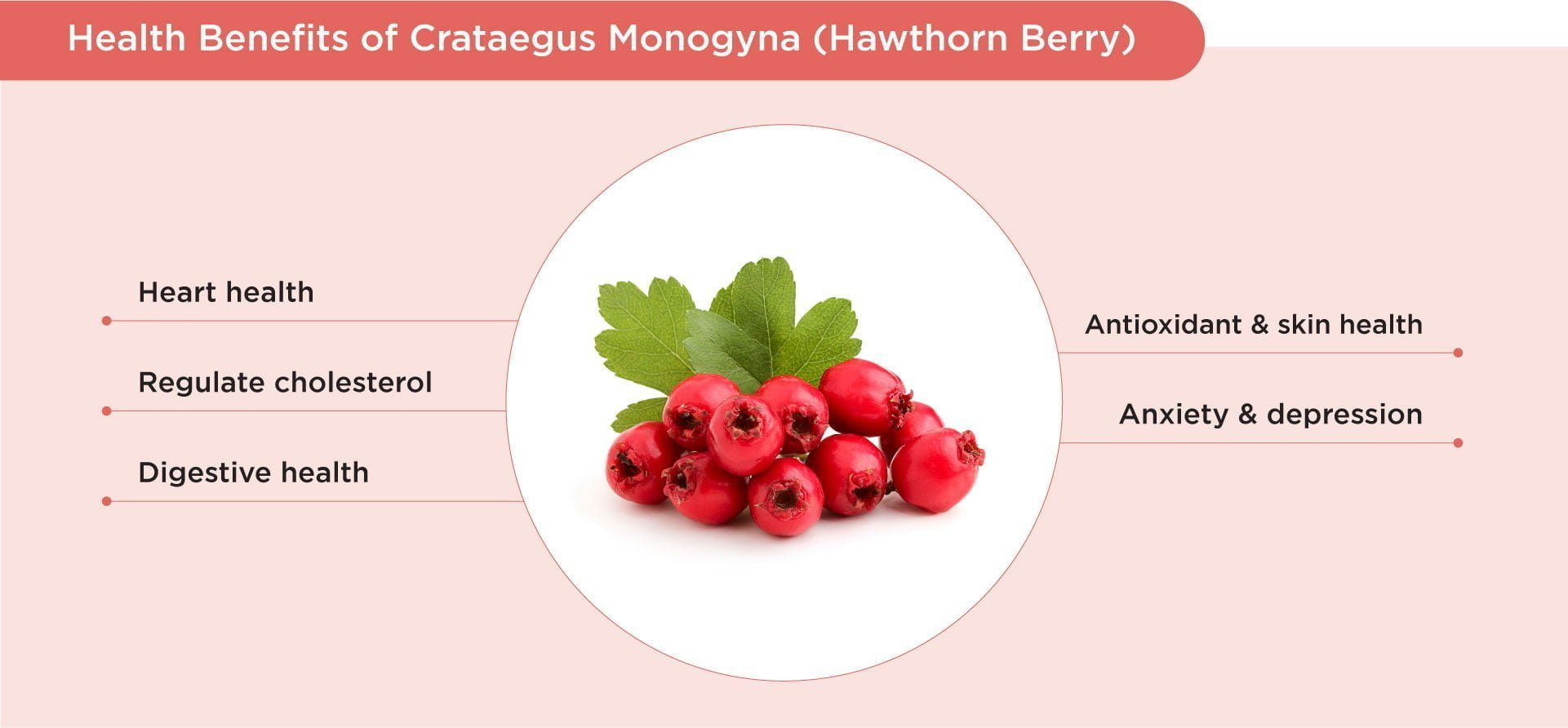Crataegus monogyna (Hawthorn)

Crataegus monogyna (Hawthorn)
Crataegus monogyna, also known as Hawthorn, belongs to the Rosaceae family. Hawthorn berries are small dark red fruits that grow on shrubs that are twisted and thorny 1. Crataegus monogyna is one of the major hawthorn species found in Europe. Various parts of the Crataegus monogyna – berries, flowers, and leaves have been used in folk medicine to treat high blood pressure, high cholesterol, heart failure, digestive problems, stress, and sleep disorders 1.
Nutritional Facts
Crataegus monogyna contains more than 150 bioactive compounds, including flavonoids, triterpenoids, oligomeric proanthocyanidins, quercetin, organic acids, and phenolic acids 1,2. Flavonoids are known to be abundant in the flower buds, while proanthocyanidins appear to be greater in unripe fruits 2. Flavonoids found in Crataegus monogyna plants are primarily responsible for the cardiac functions of the plant 2.
Published Health Benefits
1. Heart health
Flavonoids extracts from Crataegus monogyna possess high antioxidant properties that can help to strengthen the blood vessel walls, and proanthocyanidins help to dilate blood vessels, and improve blood flow in the heart muscle 2,3. It also appears to help in regulating blood pressure and is useful for mild congestive heart failure and irregular heartbeat 2,3.
2. Cholesterol
Crataegus monogyna can lower cholesterol, LDL cholesterol and triglycerides. It may lower cholesterol by increasing the excretion of bile and reduce the formation of cholesterol 1,2,3.
3. Digestive health
Crataegus monogyna has been shown to have anti-inflammatory, gastroprotective and antimicrobial activities 2. It improves the digestive process and eliminates other digestive problems such as constipation, stomach cramps, bloating and other serious conditions such as ulcers and colon cancer 5.
4. Antioxidant and Skin Health
Crataegus monogyna is a rich source of flavonoids and polyphenols, which are powerful antioxidant compounds 1,2. Antioxidants neutralise free radicals and eliminate harmful toxins in the body. It is useful in protecting the skin from UVB radiation damage 1.
5. Anxiety and Depression
Crataegus monogyna has a mild sedative effect, which may be useful for psychological conditions such as anxiety, stress, and depression 2,6. It is effective in improving mood.
References:
1. Nazhand, A., Lucarini, M., Durazzo, A., et al. (2020). Hawthorn (Crataegus spp.): an updated overview on its beneficial properties. Forests, 11(5), 564. https://doi.org/10.3390/f11050564
2. Kumar, D., Arya, V., Bhat, Z. A., et al. (2012). The genus crataegus: chemical and pharmacological perspectives. Revista Brasileira de Farmacognosia, 22(5), 1187-1200. doi: 10.1590/s0102-695×2012005000094
3. Nabavi, S., Habtemariam, S., Ahmed, T., et al. (2015). Polyphenolic composition of Crataegus monogyna jacq.: from chemistry to medical applications. Nutrients, 7(9), 7708-7728. doi: 10.3390/nu7095361
4. Wang, J., Xiong, X., & Feng, B. (2013). Effect of crataegus usage in cardiovascular disease prevention: an evidence-based approach. Evidence-Based Complementary and Alternative Medicine, 1-16. doi: 10.1155/2013/149363
5. Tadić-Vanja, M., Dobrić-Silva, & Marković-Goran, M., et al. (2008). Anti-inflammatory, gastroprotective, free-radical-scavenging, and antimicrobial activities of hawthorn berries ethanol extract. Journal of Agricultural and Food Chemistry, 56(17), 7700-7709. doi: 10.1021/jf801668c
6. Can, ÖD., Özkay, ÜD., Öztürk, N., & Öztürk, Y. (2010), Effects of hawthorn seed and pulp extracts on the central nervous system. Pharmaceutical Biology, 48(8), 924-931. https://www.tandfonline.com/doi/pdf/10.3109/13880200903305500

